How to turn off selinux in linux
Method: 1. Use the "vim /etc/sysconfig/selinux" command to open the selinux file; 2. Modify "SELINUX=enforcing" in the file to "SELINUX=disabled"; 3. After saving the modification, Just restart.

#The operating environment of this tutorial: linux7.3 system, Dell G3 computer.
How to turn off selinux in linux
The simplest and fastest way is to turn off SELinux through the command line interface, because it is basically not turned on on the server Graphical interface. First, we use the command getenforce to check the status of SELinux. By default, it is generally in the Enforcing status, which means forced enablement. As shown in the figure below:
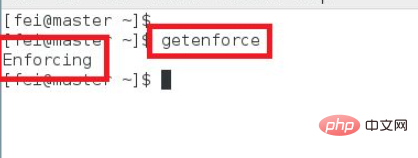
SELinux has a total of 3 states, namely Enforcing, Permissive and Disabled states. The first is the default state, which means forced activation, and the second is permissive, that is, most rules are allowed. The third is to disable, that is, do not set any rules. The first two states can only be set through the setenforce command. If you want to change it to the disable state, you need to modify the configuration file and restart the system. Let’s look at the modifications first. The value of the Enforcing state is 1 and the permissive state is 0, so it is set to permissive. The command is:
setenforce 0
Then check the current status:
getenforce
As shown in the figure below:
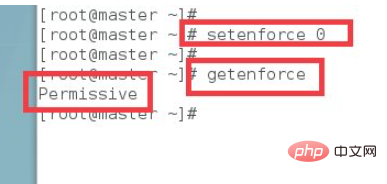
#But the modification method above will become invalid after restarting, and it will only take effect temporarily. Let's take a look at the status after restarting the computer. Execute the command:
reboot
Restart the computer, and then use the command:
getenforce
to check the status. You can see that it has indeed changed to the Enforcing state again. :
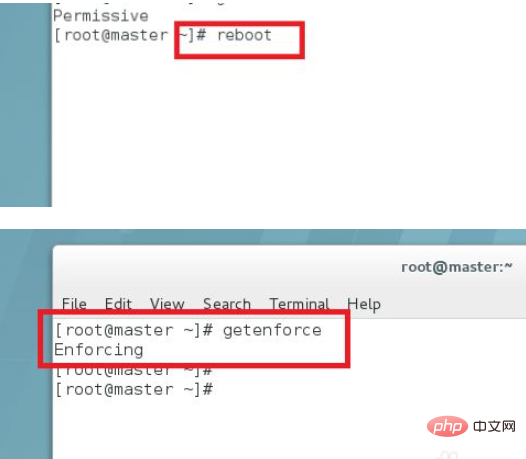
So we need to make a certain configuration permanent by modifying the settings file. The location of the configuration file is:
/etc/selinux/config
As shown in the figure below, when we open this file, we can see that its default state is the enforcing state.
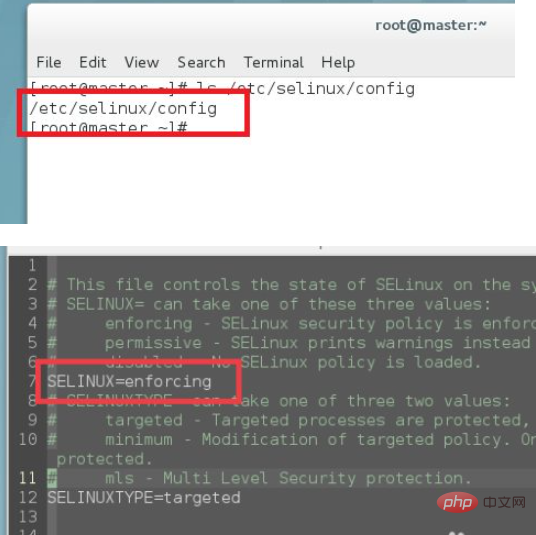
We can change the value behind it to permissive or disabled, so that even after restarting the computer, its default state will be permissve or disabled and will not be restored to enforcing status. The status after restarting is shown in the third picture below:
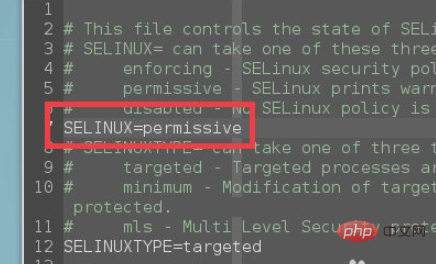
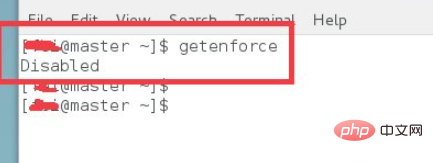

Related recommendations: " Linux video tutorial》
The above is the detailed content of How to turn off selinux in linux. For more information, please follow other related articles on the PHP Chinese website!

Hot AI Tools

Undresser.AI Undress
AI-powered app for creating realistic nude photos

AI Clothes Remover
Online AI tool for removing clothes from photos.

Undress AI Tool
Undress images for free

Clothoff.io
AI clothes remover

Video Face Swap
Swap faces in any video effortlessly with our completely free AI face swap tool!

Hot Article

Hot Tools

Notepad++7.3.1
Easy-to-use and free code editor

SublimeText3 Chinese version
Chinese version, very easy to use

Zend Studio 13.0.1
Powerful PHP integrated development environment

Dreamweaver CS6
Visual web development tools

SublimeText3 Mac version
God-level code editing software (SublimeText3)

Hot Topics
 What computer configuration is required for vscode
Apr 15, 2025 pm 09:48 PM
What computer configuration is required for vscode
Apr 15, 2025 pm 09:48 PM
VS Code system requirements: Operating system: Windows 10 and above, macOS 10.12 and above, Linux distribution processor: minimum 1.6 GHz, recommended 2.0 GHz and above memory: minimum 512 MB, recommended 4 GB and above storage space: minimum 250 MB, recommended 1 GB and above other requirements: stable network connection, Xorg/Wayland (Linux)
 Linux Architecture: Unveiling the 5 Basic Components
Apr 20, 2025 am 12:04 AM
Linux Architecture: Unveiling the 5 Basic Components
Apr 20, 2025 am 12:04 AM
The five basic components of the Linux system are: 1. Kernel, 2. System library, 3. System utilities, 4. Graphical user interface, 5. Applications. The kernel manages hardware resources, the system library provides precompiled functions, system utilities are used for system management, the GUI provides visual interaction, and applications use these components to implement functions.
 How to run java code in notepad
Apr 16, 2025 pm 07:39 PM
How to run java code in notepad
Apr 16, 2025 pm 07:39 PM
Although Notepad cannot run Java code directly, it can be achieved by using other tools: using the command line compiler (javac) to generate a bytecode file (filename.class). Use the Java interpreter (java) to interpret bytecode, execute the code, and output the result.
 vscode cannot install extension
Apr 15, 2025 pm 07:18 PM
vscode cannot install extension
Apr 15, 2025 pm 07:18 PM
The reasons for the installation of VS Code extensions may be: network instability, insufficient permissions, system compatibility issues, VS Code version is too old, antivirus software or firewall interference. By checking network connections, permissions, log files, updating VS Code, disabling security software, and restarting VS Code or computers, you can gradually troubleshoot and resolve issues.
 How to check the warehouse address of git
Apr 17, 2025 pm 01:54 PM
How to check the warehouse address of git
Apr 17, 2025 pm 01:54 PM
To view the Git repository address, perform the following steps: 1. Open the command line and navigate to the repository directory; 2. Run the "git remote -v" command; 3. View the repository name in the output and its corresponding address.
 Can vscode be used for mac
Apr 15, 2025 pm 07:36 PM
Can vscode be used for mac
Apr 15, 2025 pm 07:36 PM
VS Code is available on Mac. It has powerful extensions, Git integration, terminal and debugger, and also offers a wealth of setup options. However, for particularly large projects or highly professional development, VS Code may have performance or functional limitations.
 Where to write code in vscode
Apr 15, 2025 pm 09:54 PM
Where to write code in vscode
Apr 15, 2025 pm 09:54 PM
Writing code in Visual Studio Code (VSCode) is simple and easy to use. Just install VSCode, create a project, select a language, create a file, write code, save and run it. The advantages of VSCode include cross-platform, free and open source, powerful features, rich extensions, and lightweight and fast.
 vscode terminal usage tutorial
Apr 15, 2025 pm 10:09 PM
vscode terminal usage tutorial
Apr 15, 2025 pm 10:09 PM
vscode built-in terminal is a development tool that allows running commands and scripts within the editor to simplify the development process. How to use vscode terminal: Open the terminal with the shortcut key (Ctrl/Cmd). Enter a command or run the script. Use hotkeys (such as Ctrl L to clear the terminal). Change the working directory (such as the cd command). Advanced features include debug mode, automatic code snippet completion, and interactive command history.






